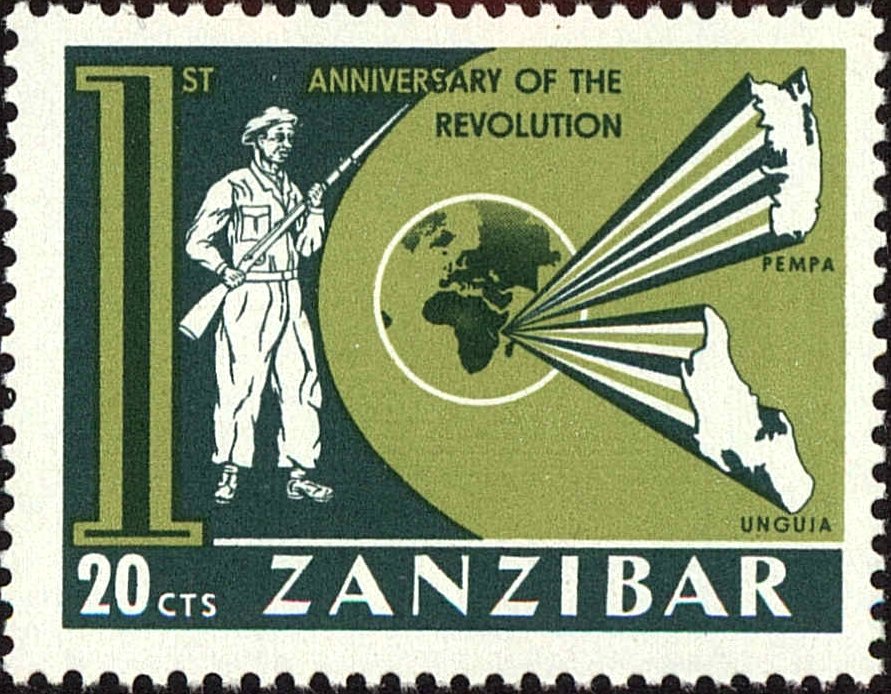Postage stamp commemorating the revolution.
Post of Zanzibar, Public domain, via Wikimedia Commons
January 12, 1964, exploited African majority groups believed to have been led by a Ugandan immigrant – John Okello, and said leader of the Afro-Shirazi Party, led an uprising against Arab and South-Asian minority domination. The revolution which brought an estimated death of 17,000 people, saw the dethronement of the Sultanate of Zanzibar – Sultan Abdullah.
The immediate aftermath of the uprising led to the dismantling of government policies that had earlier been perceived as prejudiced to favor the Arab minorities over the majority ethnic nationalities of Zanzibar. Furthermore, the Arab minorities who had remained after many had fled the country had their properties confiscated and employment in government circles revoked.
Before the uprising, Zanzibar, an island paradise located around the Indian Ocean, was a land famous for its rich aromatic spices. Consisting of several islands, Zanzibar had become a commercial nerve center around the Indian Ocean, attracting trading merchants from all over Asia, parts of Africa, and the Arabian Peninsula.
With the growing advancement of colonialism, Zanzibar fell under Portuguese rule. For over two centuries, the Portuguese governed the nation and continued to exploit commercial activities through its tributary sultans.
The suppression of local interests and disruption of trading activities would eventually push Zanzibarians through its elites to seek an alliance with the Omanis to oust the Portuguese.
As the Omani influence continued to grow, an increase in land ownership by the minority Arab population with the majority of the African population relegated to the laboring class began to become evident, thereby further widening the rift and leading to a growing discontent.
With the continued colonial push in the recorded 1884 “scramble for Africa” at the Berlin conference, Zanzibar would come under British colonial influence in 1890. Being a British colony, the Sultanic dynasty was not opposed by the British nor was it used to drive any social change as the wealth, power, and influence were still concentrated in the Arab and Asian classes.
The growing racial tensions and systemic divisions would lead to the watershed moment on January 12, 1964, a month after Zanzibar received independence and became a constitutional monarchy on December 10, 1963, as revolutionary insurrectionists would seize power and do away with its neocolonial administration.
Zanzibar would later form a union with Tanganyika on April 26, 1964, to become known as the nation of Tanzania.
For Zanzibar, a key factor that spurred the insurrections was the continued rise in unequal socio-economic relations, an issue that has continuously prevailed in many African nations and has created a growing social divide amongst its people.
Today, Africa struggles with various socio-economic upheavals that have created widening social divides leaving the continent teetering on the brink of continued social unrest and the dismantling of governments as can be seen by the various coup d’etat that swept across several African nations in 2024.
The event of Zanzibar offers a lesson on the importance of participatory governance, where the people are carried along in the decision-making process of issues that affect their lives. More importantly, It also highlights the need for various African governments to be committed to a more responsive approach to driving social change and achieving social justice that guarantees equitable resource distribution, and economic empowerment, promotes social cohesion, and provides access to key indicators that improve the human development parameters for its people.
Addressing systemic inequality which has been a bane for several African countries is a key factor in ensuring the reduced incidences of political uprisings, and driving social change for its people thereby ultimately charting a course to a more peaceful and prosperous continent.

Okechukwu Nzeribe works with the Onitsha Chamber of Commerce, in Anambra State, Nigeria, and loves unveiling the richness of African cultures. okechukwu.onicima@gmail.com





